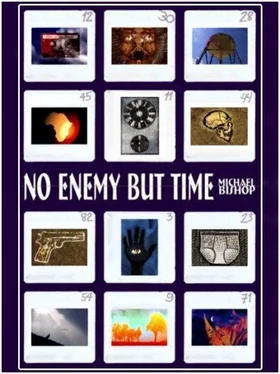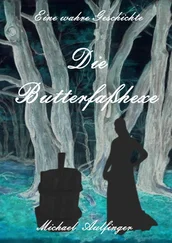Helen approached me out of the windy desolation of the veldt, Mary in her arms. Our fire whipped about madly, and my tattered bush shorts popped like a string of firecrackers. Helen wanted a reading.
She adjusted Mary on one hip and held her palm out to me.
“ Mai mwah.”
“This is the last one,” I told the Minids. “This is the last habiline palm I’m ever going to read. Do you understand?”
They said nothing. Helen waited.
Clasping her arthritic-looking hand, I declared, “Helen, you’re going to fall in love with a water-tank painter and live happily ever after. You’ll have a few so-so days, of course, blah times when you’re depressed by the international situation or the gloomy wood paneling in your mobile home. You’ll like Florida, though, and your husband’s the sort who’ll try to let you, you know, actualize your creative potential as an autonomous person . Every anniversary he’ll, uh, take you sandblasting inside some little community’s elevated water tank, where you’ll pretend you’re pioneers exploring the hollow core of another planet. This is one of the ways you’ll continually renew your romance. All things considered, it’ll be a decent, serene, unassuming life. You could do a helluva lot worse. You really could.”
Helen put Mary’s tiny hand into mine, the hand of a hirsute alien. I abruptly let it go.
“ Mai mwah.”
“No, I said I wouldn’t, Helen, and I won’t.”
Helen shifted Mary from one hip to the other and wandered aimlessly away. The Minids—dear shadows all—watched me stagger several steps after her. They wanted something more of me, the Minids did, an epilogue or an exegesis. I halted and held up my palm so they could see its lines.
“This says I’ll never betray you. I’m here to stay. I’m going to time-travel only one more time—by dying and leaving my bones for Alistair Patrick Blair to discover. Maybe he’ll give me my own taxonomic designation.”
I was openly weeping, caught between two contradictory impulses, my affection for the habilines and a sudden powerful homesickness.
“I’ve come back to you from a tomorrow you’re not yet capable of visualizing, but you must never assume that I’m the be-all and end-all of your development as a people. You must try to look beyond what you cannot yet visualize toward that which is absolutely inconceivable. Even if it’s misplaced, you must have faith in your destiny. My.45’s not solely what you’re striving for, nor is my first-aid kit. The culmination of what you have begun, O my Minidae, will be a triumph that I am altogether incapable of imagining.”
* * *
The next day we straggled without incident across the grasslands to the gentle hills at the foot of Mount Tharaka. Helen, who obviously did not feel well, permitted me to tote Mary much of this distance and spent her time foraging vegetable foods for the australopithecine child.
Our arrival near the mountain was highlighted by the appearance on the scrub-covered ridge above us of three or four hunters from another habiline “nation.” We had trespassed into their territory, and in a season of drought, when dispersal spells survival, our advent must have seemed a challenge to their dominion. Holding Mary and gazing up into the glitter of snow frosting Mount Tharaka’s peak, I heard… well, I heard ancestral voices prophesying war.
Actually, Alfie, Jomo, and Ham were hallooing to the sentinels on the ridge, and the sentinels were hallooing back. These eerie how-d’ye-dos diddled the high dells of the mountain and loop-de-looped across the grasslands. They frightened Mary. She dug her toenails into my thighs and tried to climb me like a tree. She was strong, too, strong and persistent; I virtually had to squeeze the wind from her lungs to dampen her hankering for a howdah perch on my head. At last Helen noticed our struggle and relieved me of the imp. In her adoptive mother’s arms, even as the hooting on the ridge modulated from threat into invitation, Mary quieted.
As we labored slantwise up the incline, I realized that Mary was not the only naturalized Minid who dreaded the impending encounter. I was as out of place among the habilines as she, a bran flake in a box of Cheerios. What kind of reception could we expect from the strangers on the ridge? Their faces took on specific identities as we climbed, but I still found it hard to think they were people in the sense that the Minids were people. They were attired no differently (a hairy sort of nakedness being the uniform of the epoch), and their weapons had a familiar look (cudgel, bludgeon, stave, and femur), but they reminded me of Yahoos rather than human beings. This was a visceral prejudice that I would have to uproot or sublimate. It was, I told myself, unworthy of Joshua Kampa.
Ham and Jomo seemed to have had prior dealings with the hunchbacked honcho of this other band.
(Attila Gorilla, I mentally dubbed him, for his habilines were Huns.) They presented their credentials, laying their weapons at Attila’s feet to demonstrate our peaceable aims and our willingness to beg the Huns’ indulgence while passing through their stomping grounds. Alfie, hanging back with the womenfolk, clutched the burnished thighbone of a wildebeest like a gigantic swizzle stick. If our reception proved less than hospitable, he looked altogether capable of mixing our adversaries into a habiline cocktail.
Fortunately, this did not prove necessary.
Although I could not decode the guttural gibberish in which negotiations proceeded, in a matter of moments our uneasy truce had become a friendship treaty. Following Attila’s lead, our entire band scurried down the backside of the ridge into a briary dale. On Mount Tharaka’s elevated skirts there were trees and stands of bamboo, while the snow on the overleaning peak sparkled like the slush in a frozen banana daiquiri. We threaded our way through the briar patch, debouched into a naked ravine, and climbed through the ravine toward the delicious ices of the summit. A quarter of the way up, we maneuvered clockwise along a forested shelf to the Huns’ tiny mountain resort.
The habilines here regarded Mary and me with frank suspicion. I was the more disconcerting anomaly, a buffoon with boxy feet and blowzy britches. They had never seen anything like me before. They had no words—indeed, no mental concepts—for many of my accouterments. My shorts did not completely befuddle them, but only because some of the female Huns wore crude, animal-skin cloaks, a concession to the cooler temperatures at this altitude.
In spite of their antipathy toward me, these people left me alone. The Minids, after all, had me in tow, and I was several inches taller than Attila, their own acknowledged boss man.
Mary the Huns ogled with less self-consciousness. She was an idiot child who caricatured them simply by being who and what she was. They could not seem to decide if they wanted to cuddle or cudgel her, for which reason Helen was careful about accompanying Mary on all her little jaunts about the village, an odd assortment of lean-tos and huts. I was protective of Mary, too, and found myself holding her a great deal of the time.
We stayed with these habilines for six days, and I never did develop any affection for them. They interacted well enough with the Minids, I suppose, to the extent that Mister Pibb began laying the groundwork for a liaison with a dainty Hunnish ingénue—but I did not care for our hosts’ tastes in animal flesh, which ran heavily to bushbabies, colobus, vervet, and blue monkeys.
At intervals throughout this week Helen was fiercely sick, victim to a recurring malady that I attributed to our sudden change in habitat and diet. By the end of our sixth day on the mountain these bouts of vomiting had so enfeebled her that she spent the night prostrate, but wakeful, under my care. After patting Mary to sleep, I fetched back moist compresses of moss from the trickle-out of a nearby stream and applied these to Helen’s throat and forehead. Eventually I curled up beside her to sleep.
Читать дальше



![Ally Carter - [Gallagher Girls 01] I'd Tell You I Love You But Then I'd Have to Kill You](/books/262179/ally-carter-gallagher-girls-01-i-d-tell-you-i-lo-thumb.webp)








